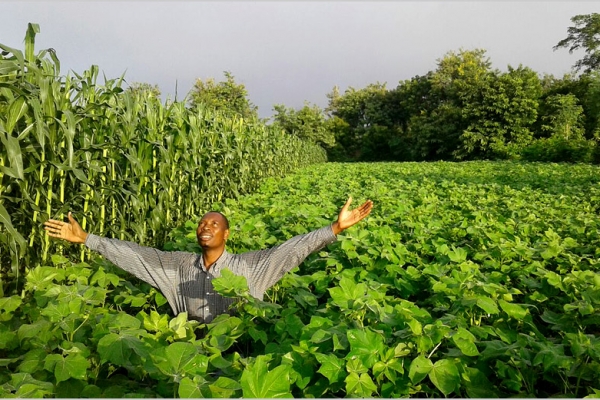
Farming God's Way
“You’re doing it wrong, boy. If your family is starving next year because this hairbrained scheme doesn’t work, don’t come crying to me.”
Simon watched as his elderly father, a subsistence farmer all his life, shook his head and strode off. He looked back at his small garden. It did, admittedly, look very different from the gardens his father had worked on in Uganda for 50-plus years. A heavy layer of mulch surrounded the mounded holes where his seeds were carefully planted.
Simon had heard of a farming method called Farming God’s Way. After several years of growing barely enough food to feed his family—with little or nothing to generate any kind of income—he was ready to take a step of faith. Farming God’s Way seemed to speak deeper into the human condition; it seemed like more than just lessons on gardening.
However, as insurance—and on the recommendation of the men who trained him—Simon planted another garden plot using traditional methods, planting with a plow—as his father had taught him—and no mulch.
Simon took a deep breath. The rainy season would start any day, and all he could do now was wait.
A Continent in Crisis
Africa should be the richest continent on earth. The land is vast, filled with natural resources and fertile soil that rival any other. But it’s been labeled “the world’s begging bowl,” earning only 5 percent of the world’s GDP. Hundreds of billions of dollars of aid have poured into the continent over the last 50 years, yet the number of people trapped in poverty continues to rise.
The causes for this dire situation are myriad and interconnected—government corruption, tribal conflicts, scars from colonialism, and lack of education, to name a few. One reason that rises to the top is poor use of the land itself by subsistence farmers. Over 750 million people in Africa are subsistence farmers, growing enough to feed their families with little leftover to sell. Traditional techniques like plowing, slash and burn agriculture, and monocropping (not rotating crops) have eroded the soil, drained the land of nutrients, and stunted crops.
Although the soil is naturally rich, many areas in Africa regularly experience extreme weather through floods or draught. This requires farming methods that are focused on soil and water conservation. (Ironically, in some places it was missionaries in the 1800s who introduced the plow and other Western-style farming techniques that don’t necessarily work in Africa’s ecosystems.)
In 1984, a farmer in Zimbabwe named Brian began what is now the Farming God’s Way movement. As the name suggests, Farming God’s Way has a solidly biblical foundation. Brian’s crop was failing, and he cried out to God for help. In that moment of desperation, Brian felt like God had been waiting to share something with him for quite some time; God led Brian to the truths of farming His way.
WGM missionaries and Ugandan church leaders were trained by the Farming God’s Way team in 2015. They slowly began to offer to train Ugandan subsistence farmers in the scriptural basis, technology, and management techniques of Farming God’s Way. Today, Ugandans are the primary trainers of the movement.
Based on the Bible
Farming God’s Way began by examining “how God farms,” looking at how plants grow in the wild. Natural mulch protects soil from erosion and holds in moisture. If the soil is stripped of all vegetation with no mulch layer, soil and seeds are washed away and the soil is leached of valuable nutrients.
“God has provided us with two great gifts: rainfall and soil,” shared John Muehleisen, missionary in Uganda who has been working to grow the Farming God’s Way movement. “Farming God’s Way is all about stewarding these two gifts.”
In addition to training on the technology and management of farming in this way, a strong component of biblical knowledge and discipleship is woven throughout. Coaches do site visits to farmers after the training to provide additional mentorship during the planting process.
One of the key verses used by trainers is Hosea 4:6 (NIV): “My people are destroyed from lack of knowledge. ‘Because you have rejected knowledge, I also reject you as my priests; because you have ignored the law of your God, I also will ignore your children.’”
Through better knowledge and understanding of the consequences of traditional agricultural methods, farmers can put into practice methods that enrich the soil rather than deplete it.
Harvesttime: The Moment of Truth
At harvesttime, Simon—despite his father’s dire warnings—reaped six times more than he had ever yielded before on the section of the garden planted with Farming God’s Way methods.
“Even by Farming God’s Way standards, that was a huge increase!” said John. “Most farmers see approximately a three-fold increase, which is still significant.”
Simon’s father was amazed by his son’s crop, and he humbly asked for advice on how he could implement the same techniques at his own garden—the one he’d been working on for over 50 years.
Soon after his harvest, Simon received an interesting phone call from the palace of his tribe’s king, the King of Busoga (Uganda has five tribal constitutional monarchies). “We hear you’re doing some interesting things in agriculture and getting good results,” the aide said. “We want to see what you’ve done.”
They came to Simon’s garden and verified the process he undertook with neighbors who had witnessed the entire planting and harvesting process. Impressed, the aides said to Simon, “If the kingdom puts on training seminars in different communities about this, would you come and train? We’d pay you.”
“Yes!” said Simon.
Lifted Out of Poverty
When a subsistence farmer’s yields generate income, an entire extended family can be lifted out of poverty.
Godfrey is a pastor and peanut farmer. He gave this testimony to John about the difference Farming God’s Way has made in his life:
“Before I did Farming God’s Way, I was always struggling to pay my children’s school fees. Sometimes, I didn’t have enough food to feed my family. I had a mud hut with a grass roof with no electricity. My kids did their homework by candlelight. Since Farming God’s Way, I have put a steel roof on my house and put solar panels on my roof. Now, my kids do their homework by clean solar LED lights. I even put a steel roof and solar panels on my dad’s house. My kids are in a better school, and I pay their school fees in full at the beginning of the term. I bought two new acres of land, and I paid cash. I have money in the bank. My friend, never before have I had money in the bank.”
Once one farmer in a community is trained in Farming God’s Way, he or she—regardless of their education level—can train others because they know how to do it.
George and Celina’s Story: From One Farmer to a Whole Community
Rev. George Naliti—with his wife, Celina—pastors a church, oversees 18 other churches, and works as an elementary school teacher in the small village of Patete. They have a small garden of plantain bananas.
George learned how to use Farming God's Way and planted a trial garden to see what the results might be. Like Simon, George planted two gardens side by side: one was planted the traditional way, and the other used the Farming God's Way approach.
When he harvested his bananas and took them to the market to sell, his "traditional" bananas sold for about $1.50 per stalk—the same price as everyone else's bananas at the market. His Farming God's Way bananas were of a quality so high above the rest that they sold for $9 per stalk!
After two seasons of working with Farming God’s Way in his own garden, George approached the principal of his school. He asked for permission to do a Farming God's Way garden with corn, using it to teach the children. (Most rural Ugandan schools have a small farm where students learn agriculture by growing food for school lunches.) The principal allocated a small plot in the worst part of the field, a section that had yielded 165 pounds of corn the year before. This was now a drought year, and no one had high hopes that anything could grow.
But George was determined, and the kids were enthusiastic about the project. At the harvest, they reaped an astounding 1,300 pounds of corn. Kids were urging their parents to come and see the corn as it was growing. People remarked, "We have never seen corn like this before in this area."
George continues to teach Farming God’s Way to others in his community, always proclaiming the message of God’s provision and wisdom. Celina said, "Farming God's Way is the gospel with boots.”
More Than Farming
Farming God's Way is not just about farming; it’s about living all areas of life rooted in Christ. This potent combination of technologically appropriate farming methods and discipleship and evangelism is based in solid science. It provides churches with a very practical way of demonstrating God's love in their communities in word and deed.
Farming God’s Way is one of a four-part initiative in WGM Uganda called Community Health Empowerment. CHE is a set of programs created to help people be restored to physical, spiritual, and relational health. In essence, CHE enables reconciliation with God, community, and the environment. The other three components are:
• Community health workers, who serve their communities by providing health training
• Women’s Cycle of Life training, focused on health and relationships
• The 4/14 Window Movement, which reaches out to children
World Gospel Mission believes that missions is reaching out to the whole person—physically, spiritually, mentally, and socially. Whole-person transformation results in whole families and whole communities being changed, mobilized, and equipped to follow God’s teachings.
“Farming God’s Way is a tool we use to help churches be more effective in their communities,” explained John. “When people see the connection between their relationship with God and the resources He’s given us on earth, the light goes on in their eyes. And the results speak for themselves.”
GIVE: Do you want to cover the cost for a farmer to be trained and equipped in Farming God’s Way? For just $20, you can provide a farmer with these valuable principles and tools for success.
GO: If helping farmers get better crop yields while growing closer to the Lord excites you, come join the team!
PRAY: Pray that Farming God’s Way will continue to help lift families out of poverty in Uganda and throughout Africa. Pray for diligence and strength for the farmers. Pray that the churches will use this tool to bring the message of God’s love to their communities. Pray for trainers as they impart biblical truths and methodology to new participants.
Rachel Elwood, staff writer
The Call (June 2018)







